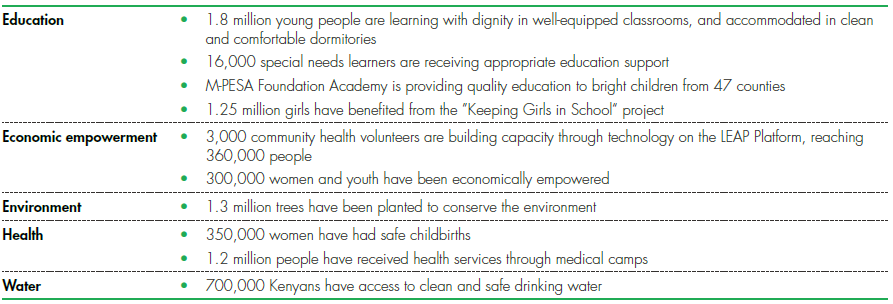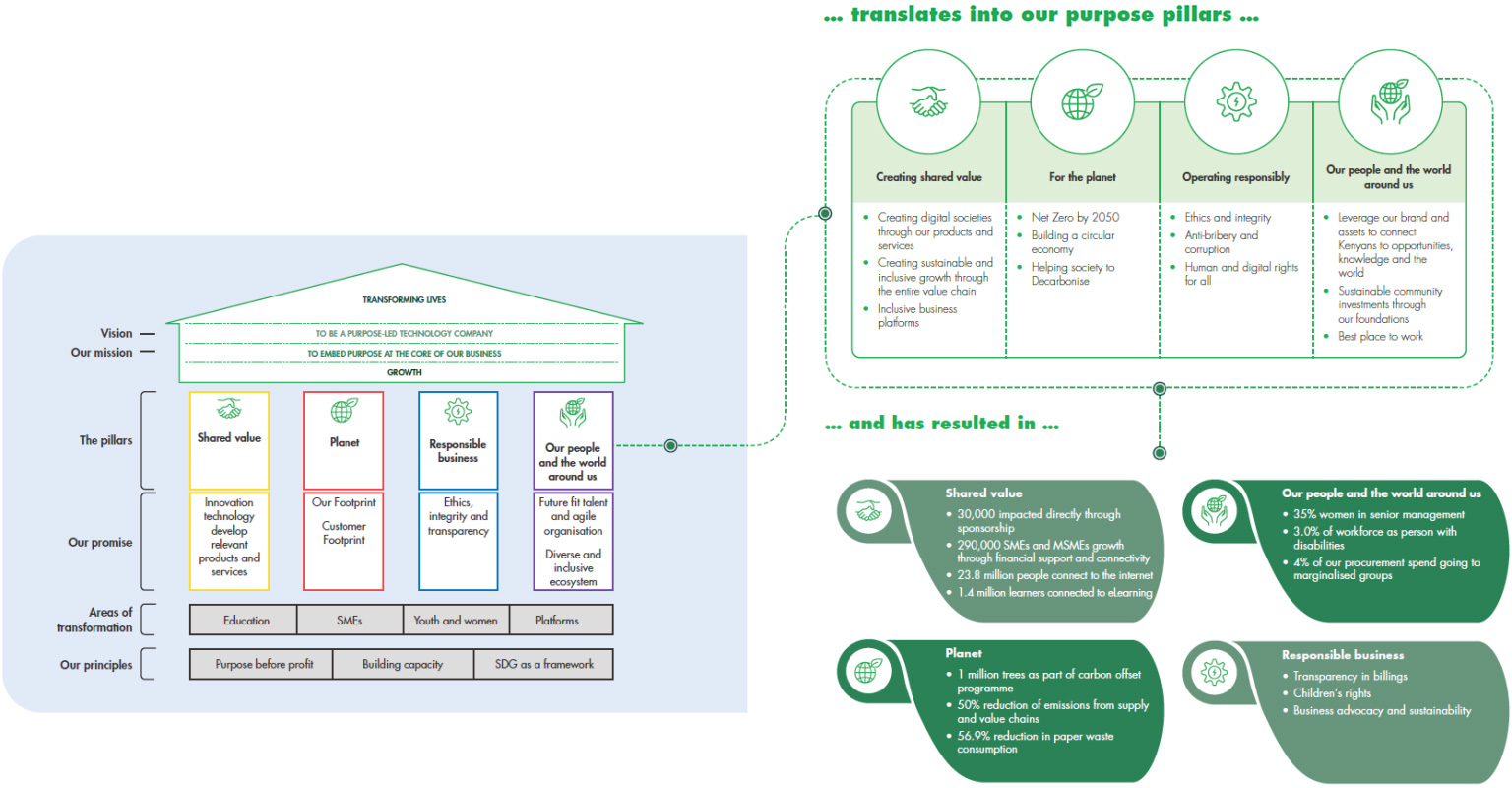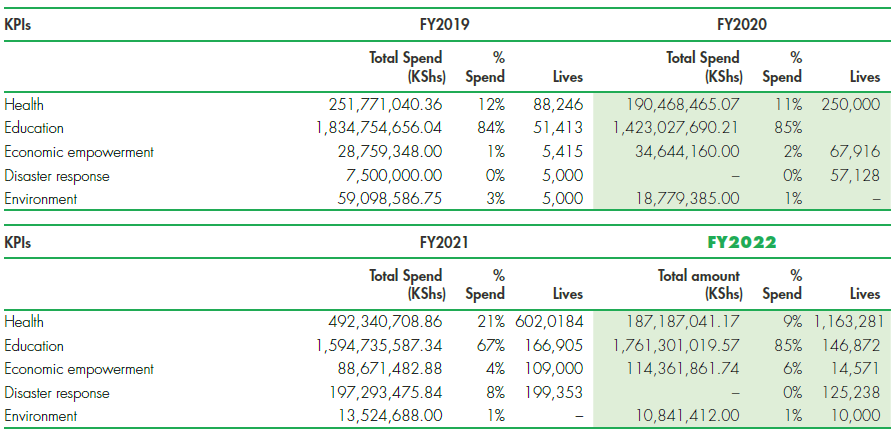
 Meeting our societal commitments
Meeting our societal commitments
At Safaricom, we pride ourselves on being a responsible corporate citizen. This is fully consonant with our purpose – to transform lives. We understand that much needs to be done to promote an inclusive society, in which all people have the opportunity to better their lives and fulfil their potential. We recognise too, that many require assistance in various ways, with education and health among two of the most important areas where meaningful projects and initiatives can make an enormous difference. And we do this in terms of our social and relationship and natural capitals.
The Safaricom and
- Established 2003, and registered as a trust, the Safaricom Foundation focuses on health, education and economic empowerment.
- Funded by Safaricom PLC at KShs 510 million per year, it has a presence in all 47 counties.
- Established 2010, and registered as a trust, the foundation focuses on large-scale, integrated programmes in health, education and economic empowerment.
- The foundation is funded through
M-PESA deposits.
Both foundations are governed by a separate and Independent Board of Trustees and the same management team.
During the year under review, we continued to implement practical, relevant and effective community projects founded on four pillars:
- Education
- Health
- Environmental conservation
- Integrated livelihoods
… is aligned with these UN SDGs 
Through our Ndoto Zetu initiative we also provide Kenyans with the opportunity to partner with the Safaricom Foundation by calling for proposals from ordinary citizens who desire to make an impact in their communities through social investment.
During the year under review, the foundation allocated KShs 100 million to Ndoto Zetu, which has made an extensive cumulative impact across our society, with over 2,000 partners and benefiting 7 million people in the areas of:

Safaricom’s partnerships focus on leveraging our mobile technologies to enhance our purpose to transform lives. Even as we co-create with partners to develop products and services that provide significant social benefits, we require shared-value partnerships to align with our goals and mission.
With our innovations having mainly focused on areas of agriculture, health and education, we continue to leverage on existing partnerships in those areas through products such as M-Tiba, DigiFarm and Shupavu 291 respectively. For more on our products and services, click here.
Among our new social innovation partnerships for the year under review, are:
- Daktari Smart: A programme developed in partnership between
M-PESA Foundation and Gertrude’s Hospital Foundation. Daktari Smart aims to use telemedicine technology to link and provide treatment to children in six hard-to-reach counties in Kenya. - Zeraki Learning: This was undertaken in collaboration with Litemore, and facilitates remote-learning content with the comfort of mobile phone use to complement teacher input in remote and disadvantaged areas. The project has reached 30% of secondary schools with 100,000 actual downloads by individual learners.
- Afya Moja: In partnership with Nakuru County we launched Afya Moja – a medical records health portability platform
which enables doctors to respond to patients’ needs effectively. Our focus is on building the first phase of the Afya Moja post pilot, a health directory aimed at impacting 500,000 subscribers and 2,000 healthcare providers by the end of the FY2023. - Retention and loyalty programme: Our Bonga points loyalty programme has evolved from being used to redeem devices, to charitable causes such as Bonga for Good, Pamoja Tuungane and Bonga for charity.
During the year under review, we continued our business advocacy on sustainability through collaborations with partners including:
- UNGC: Safaricom is a LEAD company, and the UN Global Compact provides us with a collaborative space to generate and implement advanced corporate sustainability practices as well as positioning us to inspire widespread uptake of sustainability solutions among businesses around the world.
- Acumen: Partnership on the East Africa Fellows Programme, a leadership development programme geared towards the development of the next generation of social leaders.
- Shared Value Africa Initiative (SVAI): SVAI-CEO Connect on leadership discussion between peers, focusing on competitive collaboration in Africa and growing our economy.
- UNICEF – Children’s Rights: We use our products and services to promote the rights of children and at the same time integrate child safeguards into our products, including last-mile connectivity, and education products like Shupavu, SecureNet, Baze, Instant School Networks Schools, Internet of Good Things, and the Internet Watch Foundation partnership for the online safety of children.
In the short- to medium-term, we anticipate that we will increase our momentum with the intention of:
- Implementing the Foundations’ strategic focus for FY2023, to reach two million Kenyans
- Being there for Kenyans when they need us, on the principle ”When communities thrive, businesses thrive”
- Continuing proactive community engagement
- Leveraging technology for impact and scale
- Fostering employee engagement
- Mobilising resources to do more
- Employing advocacy to influence policy
- Convening partners as a thought leader
For more on our projects and initiatives benefiting society, see our Sustainable Business Report 2022 at https://www.safaricom.co.ke/about/transforming-lives/sustainability/sustainability-reports
Meeting our environmental commitments
Our ambition is to be a net-zero emitting company by 2050.
Safaricom relies on Kenya’s green grid network which mainly relies on renewable sources such as hydropower. Our network uses a variety of energy sources including the national grid, diesel generators and renewable energy (solar) solutions, and we are committed to transitioning to renewable sources of powering our network as a strategy for achieving our net-zero aspiration.
Our aim is to remove 74% of carbon emissions through renewable energy and energy efficiency, with the intention of shifting the primary source of energy for towers (BTS) from traditional grid power and diesel, to Solar PV. Our target is to transition about 90% of the sites within five years.
In our bid to green our base stations, we have so far:
- Installed 255 hybrid sites and 56 sites with solar, with approximately 800 sites to be connected with solar in FY2023.
- Planned to modernise our power systems and retire old, inefficient ones, comprising generators, rectifiers and battery storage.
- Embarked on automating energy data collection, processing and reporting, which will enable us to increase the accuracy of our energy reports, which include consumption and carbon emissions.
- Implemented the ISO 50001: 2018 Energy Management System standard.
The remaining 26% of our carbon emissions will be offset through our reforestation programme. We have committed to grow five million trees in degraded public forests in five years and have to date planted over one million trees in Kieni forest, South Marmarnet, Nandi South, Kakamega and Port Reitz.
During the year under review, we recorded a slight increase of approximately 2%* in water consumption, with the inclusion of additional shops where consumption was not previously tracked. We will continue to track and monitor our water usage.
We saw an approximately 13%* drop in our fuel consumption. The decrease is attributable to automating our data collection for the technology dataset, which we obtain in an immediate and timely manner.
*Not assured
Through our Integrated Waste Management programme, we remain committed to ensuring that waste generated from our operations is properly managed through reduction, recycling and repurposing wherever possible.
During the year under review, we collected a total of 81,642 kg of waste collected from our administrative buildings in Nairobi and our switches in Athi River, Thika and Nairobi. Of this we managed to recycle 71,749 kg (87.9%), with the remainder not recyclable because of its hazardous nature. With hand paper towels and masks categorised as infectious waste our recycling rate was reduced.
In FY2023 in is our intention to roll out the integrated waste management programme to an additional 61 shops, offices and data centres.
In addition, we have:
- Eliminated 98% of single-use plastic use across the business
- Achieved a 56.9% reduction in paper consumption/waste, driven by our adoption of digital technology to review and sign off documents
E-waste continues to be a growing regulatory concern. We face challenges especially in disposing of network infrastructure as it reaches end of life. Nevertheless, we expect that through regulation, the process will move from a linear model to a circular economy.
We will be able to harness the opportunities presented by a circular economy, through reuse, recycling, refurbishing and repair of network infrastructure. Among the anticipated benefits are savings on capex and reduced carbon emissions. Our strategy is to:
- Reduce e-waste generation
- Recycle where possible
- Re-use or redeploy decommissioned systems at other sites
In addition, we have established external partnerships to train the informal sector on repairing electronic waste and device take-back schemes. Informal sector waste collectors handle substantial amounts of e-waste in urban centres.
We have collected and recycled over 1,626 tonnes of e-waste since the inception of our e-waste programme.
Safaricom made a commitment under the Business for Nature Action platform that calls upon businesses and governments to adopt policies that reverse nature loss, and we continuously strive to invest in conservation and ecological projects. We also work in partnership with the government and other stakeholders in biodiversity conservation. We are also engaging with other private sector on biodiversity conservation specifically on reforestation.
One of our current conservation projects through
The
While we do not have any assets near threatened, vulnerable, endangered, and critically endangered species’ habitats, in expanding our network infrastructure, we ensure that all network projects are subjected to the statutory Environmental Impact assessment to identify all associated impacts in order to develop alternatives that avoid or mitigate the impacts to our country’s rich biodiversity.
We also conduct continuous monitoring and evaluation of implemented project impacts, through annual environmental audits. Similarly, at asset end-of-life, we endeavour to enhance or restore the environment to its natural state. In addition, we view positively participation in voluntary initiatives that support biodiversity protection in Kenya, such as safeguarding endangered species and poaching prevention.
In our commitment to sustainability, we recognise and adhere to globally accepted standards, and have accordingly:
- Developed a company-wide purpose strategy that includes our sustainability strategy. The strategy defines our ”why“ and outlines the resulting impact in the community in which we operate, through:

Innovative products and services 
Our commitment to managing our environmental impact 
Our commitment to our employees and stakeholders in our ecosystem and how we conduct business responsibly - Continued to integrate UN SDGs into our business operations. We see the UN SDG framework as a business strategy to guide our innovations, products and services, and our business operations. The SDG Framework is also a business strategy for shared value opportunities.
- Received the recommendation for continued for ISO14001 Environmental Management Systems certification for our environmental management system.
- Continued to undertake statutory environmental occupational health, safety and fire risk audits for BTS sites, with our network projects subjected to the statutory Environmental Impact Assessment to identify all impacts associated with the project, in order to avoid or mitigate the impacts.



